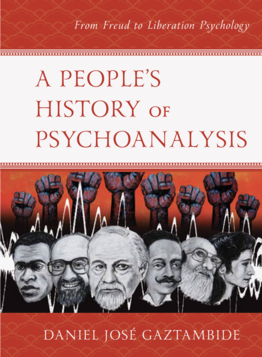A People’s History of Psychoanalysis: From Freud to Liberation Psychology
Book Description:
In a world marked by widening inequality, is psychoanalysis too White and for the well-to-do to be relevant to social, economic and racial justice? Are its ideas and practices too alien for people of color? Can it explain why systems of oppression are so stable and how oppression becomes internalized? In A People’s History of Psychoanalysis, Daniel José Gaztambide reviews the oft-forgotten history of social justice in psychoanalysis.
Starting with the work of Sigmund Freud and the first generation of left-leaning psychoanalysts, Gaztambide traces a series of interrelated psychoanalytic ideas and social justice movements that culminated in the work of Frantz Fanon, Paulo Freire, and Ignacio Martín-Baró.
Through this intellectual genealogy, Gaztambide presents a psychoanalytically-informed theory of race, class, and internalized oppression that resulted from the intertwined efforts of psychoanalysts and racial justice advocates over the course of generations--giving rise to Liberation Psychology. This book is recommended for students and scholars engaged in political activism, critical pedagogy, and clinical work.
Advance Reviews for A People’s History of Psychoanalysis:
A cogent combination of psychoanalysis and liberation theology that produces an original psychology of liberation… A People’s History of Psychoanalysis gives a compelling account of the ignored emancipatory potential of psychoanalysis. Gaztambide’s innovative book is a must-read for anyone interested in an ethics of social justice that gives the unconscious its authentic political dimension.
— Patricia Gherovici, author of The Puerto Rican Syndrome, Transgender Psychoanalysis
A People’s History of Psychoanalysis: From Freud to Liberation Psychology contributes mightily to the healing of psychoanalysis’ self-inflicted wound: the amputation of issues of social justice from those of psychological well-being… By integrating the histories of liberation psychology and psychoanalytic thought, Gaztambide points to a future where those committed to psychological thriving must attend to issues of social justice.
— Mary Watkins, Pacifica Graduate Institute; author of Mutual Accompaniment and the Creation of the Commons; coauthor of Toward Psychologies of Liberation
Daniel Jose Gaztambide offers a welcomed rethinking of the place psychoanalysis has held in struggles for social justice. With compelling evidence and detail, Gaztambide charts a network of influences that extend from psychoanalytic figures like Sigmund Freud to founders of Liberation Psychology like Frantz Fanon and Paulo Freire.
— Sheldon George, Simmons University; author of Trauma and Race: A Lacanian Study of African American Identity
Reviews for A People’s History of Psychoanalysis:
Gaztambide’s book… can already be called a classic. It is an exceptional piece of scholarship that brings to light much of psychoanalytic history that has been lost, ignored, and pushed into the darkness. A core element of the psychoanalytic process involves looking for and probing into gaps and omissions in the patient’s narrative. At a larger scale, then, we need to probe into what has been omitted from our psychoanalytic history and ask how this has occurred and how reintegrating this lost history can impact psychoanalysis today… Gaztambide’s book is an extraordinary accomplishment.
—The American Journal of Psychoanalysis
Gaztambide… moves psychoanalysis [toward] the discipline’s entanglements with Marxism, antiracism, and social justice practice… The book’s conclusion demands that its reader not merely take in this history as a past to celebrate and critique, but use it in working toward restoring social justice aims to clinical practice. A People’s History of Psychoanalysis offers a lineage and tradition of mental health praxis that will be especially rewarding to those participating in contemporary conversations about the radical potential of psychoanalysis alongside its whiteness and conservative tendencies across the last 70 years.
—Los Angeles Review of Books
[The] story [A People’s History of Psychoanalysis] tells is a persuasive one, and in drawing together its various elements Gaztambide shows their intriguing and under-reported connections and presents psychoanalysis as much closer to the source of liberation psychology than many of us would have previously thought… it is a good read. More than that, it is a useful and passionate presentation of how some of the most politically committed and progressive activists and thinkers of the twentieth century used psychoanalysis to inspire them. This, at least, is something to encourage us all.
—Psychoanalysis and History
Gaztambide’s timely, fascinating, scholarly, and highly readable book revives an aspect of the history of psychoanalysis that is often forgotten: its involvement in the fight for social justice… [this] fascinating and superbly researched book should be read by every psychoanalyst, psychoanalytic therapist and scholar of psychoanalysis, and its insights, including the notion of political mentalization and the impact of trauma on marginalized persons, should be an integral part of psychoanalytic and psychodynamic training… Gaztambide advocates we enlarge the mission of psychoanalysis again to become more relevant and fair-minded in our multi-cultural society.
—American Imago


